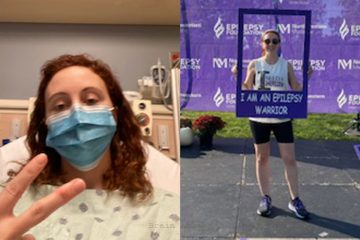It could be argued I am a pretty fearless person. The medical examinations, treatments, and scrutiny that I have undergone for years has made me tougher and braver than most. I do not say this as a brag, I say this simply as an observation as I have grown up. Being a “sick” kid (a label that I hate, by the way) is a unique experience that sets one apart from the “normal” stages of development as you are forced to grapple with what it means to be different in both your body and in society.
During my two-week winter break from university, I scheduled an ambulatory EEG at UCSF, my first since entering the adult world of pediatric neurology. I walked into UCSF neurology at 7:30 am, after getting 4 hours of sleep the night before, utterly groggy and disoriented. As the EEG tech hooked me up I tried to make conversation, my natural go-to with anyone new, which benefits me most times, and other times backfires. “Kids?”
“A three-year-old. They can’t wait till Christmas.”
“Have you had seizures all your life?”
“Since I was 6.”
“Wow.”
I had forgotten how uncomfortable the process of putting on an EEG was. For some reason, I thought it would be easy and painless, that all the EEGs before would prepare me for this one. I had not had an EEG cap on in about 2 years, not since I moved from the caring hands of pediatric neurology to adult neurology.
But I survived, the cognitive tests, the hyperventilation and the flashing lights, got a cup of coffee and a breakfast burrito, and went home.
The EEG was pretty standard for the ost part-flashing lights and hyperventilation, that, at 7:30 in the morning, made me dizzy. But I survived, the cognitive tests, the hyperventilation, and the flashing lights, got a cup of coffee and a breakfast burrito, and went home.
Growing up with epilepsy, I became quite accustomed to the routine of doctor’s appointments, EEG, medicine changes, and my mom taking me out to lunch after the appointment as she looked at me with concern. I believe I survived my childhood with epilepsy because I had access to such great medical care, an amazing support system and family, and I knew what to expect when going to my neurologist. I was not scared of the hospital-EEGs, MRIs, or fMRIs, and didn’t understand why, when I told other kids, and then adolescents I would be getting routine brain scans, they looked at me as if I had told them my pet had just passed on. At one point in middle school, a friend got me a stuffed animal after a neurologist’s appointment, as a condolence. At the time, I didn’t understand how uncomfortable mentioning your illness made people. I thought this wasn’t a big deal, and I equated it to just any other fact about me, which in a sense, it is.
Another “aha” moment was also in middle school, when a boy who had a serious crush on me told me that he had a well-thought-out fantasy of me having a huge seizure, being in a coma, and almost dying. He would be the only one who could save me from certain death. I remember that this was one of my first incredibly uncomfortable experiences related to how people interpret seizures, and I didn’t know what to say, and more importantly, I didn’t have any peers who understood my experience to say “Oh my goodness! What the heck was that?” I had come face to face with the fact that epilepsy was something that other kids considered taboo.
During elementary school, I lived in Baltimore Maryland, and my best friend was a girl who chose not to talk. She was diagnosed with selective mutism-and even around me-someone who she spent up to eight hours a day with-she did not talk. When I would talk, she would write back in her journal, and this was how we communicated. I remember vividly going to a speech pathologist with her, and being there as they urged her to make sounds- “say the s sound”. Later, teachers would beckon us over asking her to make alphabet sounds, where she would break down into tears.
It was 2005-and we were 6 years old. But her silence did not define our friendship. Reflecting on it as an older person, I wonder if, unconsciously, it was because of my own disability and the way I saw other children perceive her silence and the way I felt isolated in my own disease that contributed to me accepting her silence so quickly.
… I felt isolated in my own disease …
It is an especially isolating experience to grow up with a normal that is declared strange or worthy of sympathy by adults and children alike. I rarely stew over the supposed tragedy of my epilepsy diagnosis, because to me, epilepsy has just been a reality that I have dealt with for so long. I do not know what life would be like without it. Most of the time, I am annoyed at the sympathetic glances I get from people who tell me they are sorry that I have epilepsy. I understand the need to say something socially appropriate in that uncomfortable, awkward silence, but when people say this I wonder who they are sorry for. Me? Or do they just want an end to an uncomfortable conversation?
I have also realized, growing up, that most everyone has an aspect of their identity or life that other people think is abnormal, however, it is the relationship between how the person sees this aspect of themselves and the way society views it that contributes to making changes to the social norm. A generation ago being gay was considered especially strange, and now marriage equality has passed and there are pride parades in June that even straight people attend to show support. Talking about seizures with people who do not have seizures, teaching them seizure care, and telling them what it means is the way to destigmatize the illness as well as spread awareness. 1 in 26 people have epilepsy, however people with epilepsy do not always “come out of the closet”, sometimes for fear of losing or being denied access to certain opportunities due to the stigma. I think it is essential for people with epilepsy to educate others about what it means to have epilepsy if we want to raise awareness, promote research and understanding of the disease.
© 2021 Katie Nunn All Rights Reserved



0 Comments